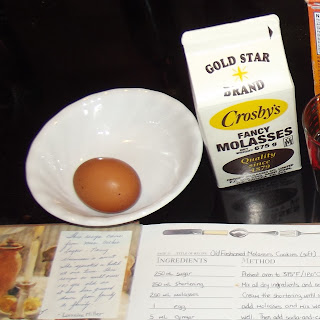Monday, September 30, 2013
Cider 101 with Shovel & Fork
On Sunday, I got to take a cider-making course with Chad and Kevin from Shovel & Fork. Lucky me! If you are in or near Edmonton, you need to check them out - they do all kinds of fantastic skill-sharing courses, from kitchen gardening to butchery. With their permission, I'm sharing a few photos from the course. Naturally, for the complete details, you really ought to sign up the next time this is offered.
Saturday, September 7, 2013
My Cherished Canadian Recipe: Old-Fashioned Molasses Cookies
While I have lived in Edmonton since 1994, I grew up in Nova Scotia, in a family that has been in that part of the world for generations. I've mentioned my family background before, a mishmash of South Shore German and Swiss, Annapolis Valley English-via-Connecticut Planters, Parrsboro-area English-via-Massachusetts Loyalists, and a series of adventurous brides who crossed The Pond from England to make new lives with dashing sea captains. The recipe I'll share today comes from my husband's family. His dad's people were English sailors who stayed in Halifax when their time in the Navy ended, and Gaelic-speaking Scots whose families came to Cape Breton during the Highland Clearances; his mom's folks are Acadian French who found refuge in the wilds of New Brunswick and married Quebecois families after the Expulsion. (Some early Acadian families are also Metis by blood, although records are so scarce that mitochondrial DNA tests are often the only evidence, and the Metis families were integrated into Acadian culture, instead of developing a distinct culture as happened on the Prairies.)
Molasses was a kitchen staple in the Maritimes as a result of the trade triangle between the Caribbean, Nova Scotia, and Great Britain. We shipped timber out - or turned the timber into sailing vessels - and the ships returned laden with molasses from the sugarcane plantations. (Rum is the favoured distilled alcohol of the Maritimes for the same reason.) For more on the history of molasses as a Canadian food, check out this great post from Bridget Oland from earlier in the Canadian Food Experience series.
This soft molasses cookie recipe is a family favourite that is now at least 120 years old. It came from Mrs. Archie Legere, an aunt of my husband's Acadian grandmother, who operated a hotel at one time (at least, according to the notes in the margin of the recipe card made by my husband's Aunt Lorraine Miller). I believe it originally would have been made with butter instead of shortening, and been written with imperial measurements instead of the metric provided by Aunt Lorraine (who was a high-school home economics teacher).
Molasses was a kitchen staple in the Maritimes as a result of the trade triangle between the Caribbean, Nova Scotia, and Great Britain. We shipped timber out - or turned the timber into sailing vessels - and the ships returned laden with molasses from the sugarcane plantations. (Rum is the favoured distilled alcohol of the Maritimes for the same reason.) For more on the history of molasses as a Canadian food, check out this great post from Bridget Oland from earlier in the Canadian Food Experience series.
This soft molasses cookie recipe is a family favourite that is now at least 120 years old. It came from Mrs. Archie Legere, an aunt of my husband's Acadian grandmother, who operated a hotel at one time (at least, according to the notes in the margin of the recipe card made by my husband's Aunt Lorraine Miller). I believe it originally would have been made with butter instead of shortening, and been written with imperial measurements instead of the metric provided by Aunt Lorraine (who was a high-school home economics teacher).
Subscribe to:
Comments (Atom)

